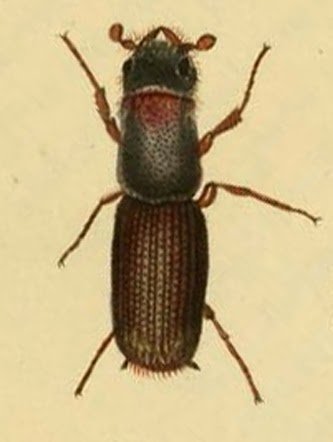Here in Tasmania, our local creeks and rivers are home to one of Australia's most enigmatic mammals; the platypus. Often you will first detect them by the wake they create as the glide along the surface of the water. Sunlight reflecting off the wet surface gives the animal a silvery appearance, making it difficult to discern any real detail, and then it dives back under. That's usually as good as it gets. However, two years ago, I was visiting a place known as Fern Glade for a bit of birding but I soon found myself sidetracked. I couldn't believe my luck when a Platypus hauled itself out onto a log to have a good old scratch. I didn't have my camera tripod so I leaned against a tree to try to steady the camera. After ten minutes my arm was aching from trying to hold it still but at the same time I was smiling from ear to ear. It was one of those singular experiences where you get to share the moment with an otherwise secretive animal.
For anyone not familiar with this semi-aquatic mammal, the Platypus is a bit of a zoological enigma. When the first specimens were sent to Europe, many thought it was some sort of clever taxidermic hoax. An egg laying mammal with webbed feet, a duck-like bill, and a beaver's tail. The male even has venomous spurs on the hind limbs. (You can see these spurs in the video.) (If you are not interested in the next section on the naming of the Platypus then you may want to scroll down for a poem by Banjo Paterson.)The Naming of the Platypus
A quick search on the web came up with several aboriginal names for the Platypus. They include, Oonah, Boondaburra, Biladurang, Mallingong and Tambreet. Other European names are, Duckbill, Duck-billed platypus, Duckmole, and Watermole, Interestingly, the current common name, Platypus, is actually from the original scientific name. Dr George Shaw named it Platypus anatinus back in 1799. Platy - from the Greek platýs meaning flat
Pus - from the Greek poús meaning foot
Anatinus - Anatis is latin for duck. Anatinus means, "concerning a duck"

The original Platypus, a Weevil - Platypus cylindrus
Picture from British Entomology Vol 2 Plate51 Author John Curtis (1791–1862)
Ornitho - from Greek ornis or ornith meaning bird.
rhynchus - from the Greek rhýnchos meaning bill or snout.
paradoxus - as in the English word paradox.
The Platypus Through the Eyes of Mark Twain and Banjo Paterson
Mark Twain quotes a New Zealand Naturalist who seems to have his own name for the Platypus ( as well as his own system of trinomial nomencalature). He calls it, Ornithorhynchus Platypus Extraordinariensis. This naturalist (who is known simply as Christian) was apparently a bit of a poet and Twain quotes the following verses about the platypus:O Ornithorhynchus dear!
And greet with a cordial claw
The stranger that longs to hear From thy own lips the tale
Of thy origin all unknown:
Thy misplaced bone where flesh should be
And flesh where should be bone; And fishy fin where should be paw,
And beaver-trowel tail,
And snout of beast equip'd with teeth
Where gills ought to prevail.
Of course our own Banjo Paterson also wrote poetry about the Platypus:
Old Man Platypus
(Banjo Paterson - 1933)
Far from the trouble and toil of town,
Where the reed beds sweep and shiver,
Look at a fragment of velvet brown,
Old Man Platypus drifting down,
Drifting along the river. And he plays and dives in the river bends
In a style that is most elusive;
With few relations and fewer friends,
For Old Man Platypus descends
From a family most exclusive. He shares his burrow beneath the bank
With his wife and his son and daughter
At the roots of the reeds and the grasses rank;
And the bubbles show where our hero sank
To its entrance under water. Safe in their burrow below the falls
They live in a world of wonder,
Where no one visits and no one calls,
They sleep like little brown billiard balls
With their beaks tucked neatly under. And he talks in a deep unfriendly growl
As he goes on his journey lonely;
For he's no relation to fish nor fowl,
Nor to bird nor beast, nor to horned owl;
In fact, he's the one and only!
Such an unusual creature, I did not realize they were poisonous!
Downvoting a post can decrease pending rewards and make it less visible. Common reasons:
Submit
Only the males have venom. The pain it inflicts is said to be excruciating and long lasting. I hope never to have first hand experience ☺ Thanks for visiting.
Downvoting a post can decrease pending rewards and make it less visible. Common reasons:
Submit
awesome post :)
Platypus are such interesting animals ;)
Downvoting a post can decrease pending rewards and make it less visible. Common reasons:
Submit
Thanks for visiting.
Downvoting a post can decrease pending rewards and make it less visible. Common reasons:
Submit
Hi! I am a robot. I just upvoted you! I found similar content that readers might be interested in:
http://tasnature.blogspot.com/2015/03/exceptional-view-of-platypus.html
Downvoting a post can decrease pending rewards and make it less visible. Common reasons:
Submit
My old blog :-) Now removed.
Downvoting a post can decrease pending rewards and make it less visible. Common reasons:
Submit
Congratulations @mostly.nature! You have completed some achievement on Steemit and have been rewarded with new badge(s) :
Click on any badge to view your own Board of Honnor on SteemitBoard.
For more information about SteemitBoard, click here
If you no longer want to receive notifications, reply to this comment with the word
STOPBy upvoting this notification, you can help all Steemit users. Learn how here!
Downvoting a post can decrease pending rewards and make it less visible. Common reasons:
Submit